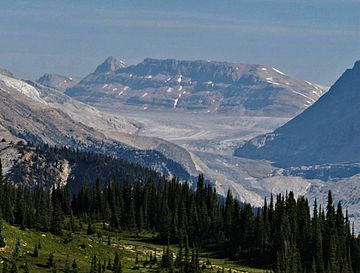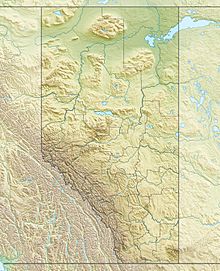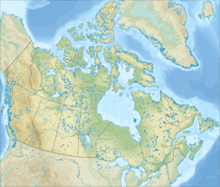Mount Rhondda facts for kids
Quick facts for kids Mount Rhondda |
|
|---|---|

Mount Rhondda seen with Yoho Glacier from Iceline Trail
|
|
| Highest point | |
| Elevation | 3,062 m (10,046 ft) |
| Prominence | 102 m (335 ft) |
| Parent peak | Mount Habel (3087 m) |
| Geography | |
| Country | Canada |
| Parent range | Waputik Mountains |
| Topo map | NTS 82N/10 |
| Climbing | |
| First ascent | 1923 A. Geoffrion, J.W.A. Hickson, Edward Feuz Jr. |
Mount Rhondda is a cool mountain that sits right on the Continental Divide. This means it's partly in Alberta and partly in British Columbia, two provinces in Canada. The mountain got its name in 1917 from a survey team. They named it after a person named David Alfred Thomas, who was also known as the First Viscount Baron Rhondda. He was an important person in politics back then.
Climbing Mount Rhondda: The First Ascent
Mount Rhondda was first climbed in August 1923. A team of three climbers, A. Geoffrion, J.W.A. Hickson, and Edward Feuz Jr., made this first successful climb.
Their original plan was to be the first to climb nearby Mount Baker. But as they started their climb, they found tracks from another group. This other group, Walter Wilcox and Rudolf Aemmer, were already heading towards Mount Baker.
So, the team changed their plans. They went to the low point between the two peaks, called a "col." There, they saw snow tracks and a small pile of rocks, called a "cairn," on Mount Baker's top. This meant Mount Baker had already been climbed.
With Mount Baker already claimed, they decided to focus on Mount Rhondda instead. They reached the top of Mount Rhondda in the early afternoon. They climbed over a mix of rock and snow to get there.
Understanding Mount Rhondda's Rocks
Mount Rhondda is made of sedimentary rock. This type of rock forms from layers of sand, mud, and tiny bits of sea creatures that settle over millions of years. These rocks were laid down during very old time periods, from the Precambrian to the Jurassic eras.
Long ago, these rocks formed in shallow seas. Later, during a big event called the Laramide orogeny, these rock layers were pushed up. They were even pushed east and over the top of younger rocks, creating the mountain we see today.
Mount Rhondda's Weather and Climate
The weather at Mount Rhondda is known as a subarctic climate. This means it has very cold winters with lots of snow. The summers are usually mild, not too hot.
Temperatures in winter can drop very low, sometimes below −20 degrees Celsius (which is −4 degrees Fahrenheit). When the wind blows, it can feel even colder, making it feel like −30 degrees Celsius (or −22 degrees Fahrenheit) or even colder.
 | Janet Taylor Pickett |
 | Synthia Saint James |
 | Howardena Pindell |
 | Faith Ringgold |



